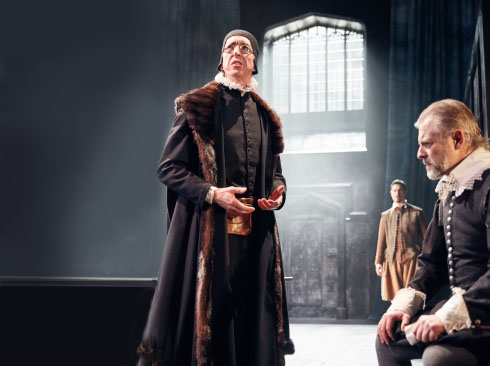
I suppose it was inevitable; Shakespeare himself and various of his characters have been given their own spin-off plays and films so perhaps it was only a question of time until writers started to poke around in his family’s skeleton cupboard.
Peter Whelan’s successful 1996 play, which had its first outing as an RSC production and is here revived for a tour, takes the marital problems of the bard’s daughter, Susanna (Emma Lowndes), as it’s starting point. Susanna made an apparently enviable match with a certain, Doctor John Hall, a moderate Puritan, but an ecclesiastical court record of Susanna’s trial for adultery is enough to suggest that all was not well within the Hall’s marriage bed. Whelan has taken the historical fact and used it to anchor a play which is as much about religious zealotry as marital infidelity.
In 1613 religion was the pre-eminent cord that bound society together and woe-betide anyone daring to loosen that tie by recusancy, blasphemy, heresy or any other flavour of religious contumacy. Adultery was considered a heinous religious crime and accusations were easy to make. In the play Susanna’s accuser is Jack Lane (Matt Whitchurch), a bit of an idle toff and Jack-the-lad, who is apprenticed to John Hall whose area of expertise was in the mixing and administering of herbal remedies. Lane is rebuffed in his advances to Susanna who also castigates him for his lewd advances to her maid, Hester (Charlotte Wakefield). Lane blabs in the pub about Susanna having a relationship with one Rafe Smith (Philip Correia) a politically aware haberdasher, with whom she had indeed had an as yet unconsummated relationship. Word soon gets around town and before she knows it Susanna is up before an ecclesiastical court having to defend her good name.
The first act contains a lot of scene setting with much forgettable stuff about herbs and some more interesting information about the loveless and sexless marriage in which Susanna finds herself. Echoing the sentiment on Chaucer’s Prioresse’s brooch, ‘Amor Vincit Omnia’, Susanna, who seems eager to ‘make the beast with two backs’ with Rafe, urges the case that love trumps other moral considerations when she declares that it changes us by a kind of alchemy. The play finally gets going in the second act with the trial and entrance of the religious fanatic, Barnabus Goche (Michael Mears). His uncompromising pursuit of the last scintilla of guilt has the participants examining their consciences for their own relationship with the facts, which they decide can be one of economy. This strategy nearly cooks their goose as Goche’s relentless cross-examination proves the adage in Marmion, “Oh! What a tangled web we weave / When first we practice to deceive!”. Ultimately the case fails when the accuser retracts and Goche swans off to do God’s work on Lane himself.
The play has little to do with Shakespeare other than to remind us of the febrile religious atmosphere in which he was writing. Ms Lowndes’ Susanna is a woman, literate, intelligent and determined not to let life pass her by because of arbitrary or religious convention and the play as a whole, whilst not particularly original in its thinking, succeeds in giving flesh to ideas that were becoming voiced in the early 17c. ★★★☆☆ Graham Wyles at Bath Theatre Royal on 13th April 2016

